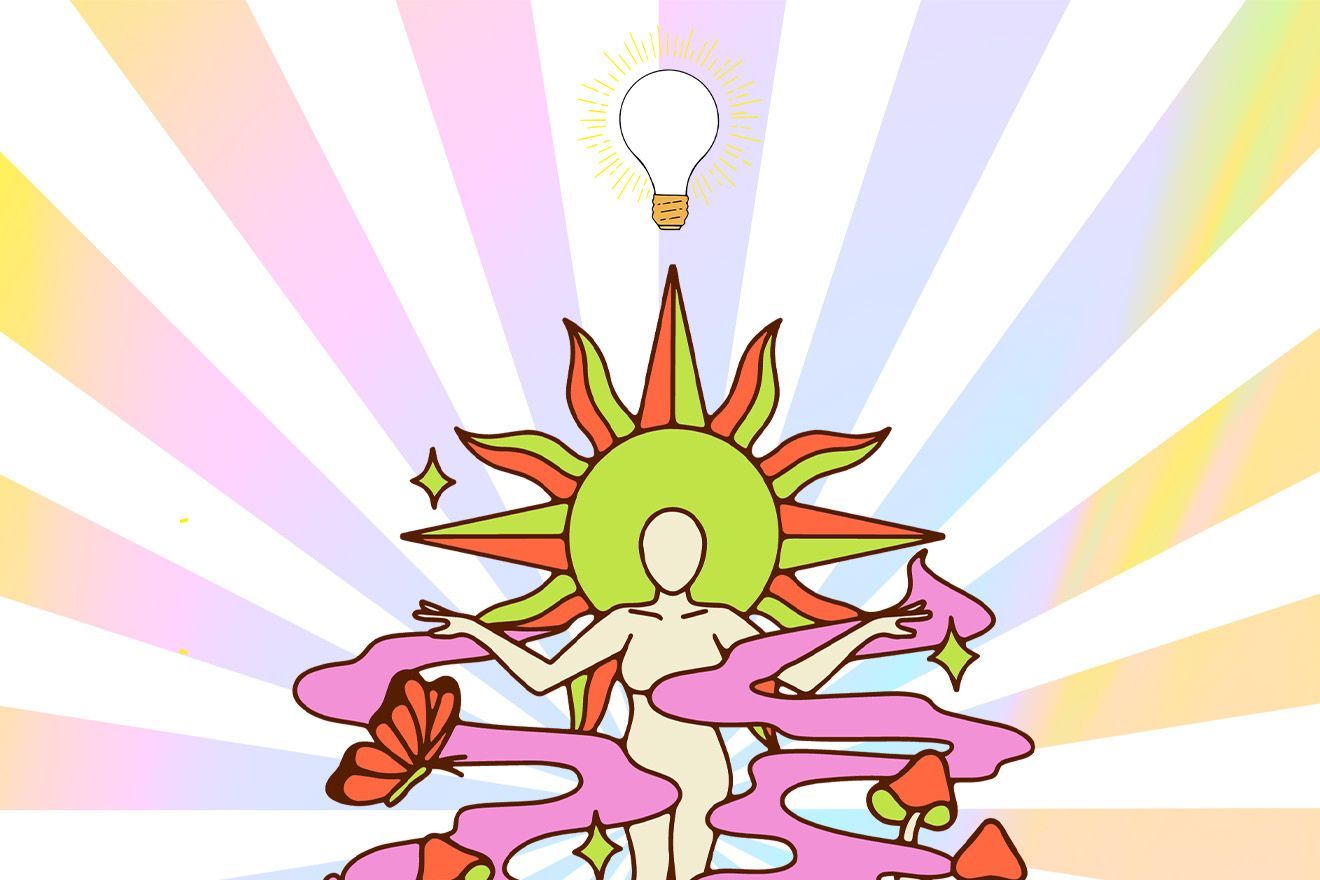You don’t have to be in the midst of a psychedelic experience to have an “aha” moment of realization. These flashes of insight can give a new perspective, opening our eyes in new ways. How do psychedelics create these realizations? And how can therapists help patients integrate them into daily life? Let’s explore the meaning behind “aha” moments in psychedelic therapy.
Moments of realization can help us re-orient ourselves in the world. Maybe a flash of insight helped you see that a relationship wasn’t working, or that it was time to move on to a new career path. Patients participating in standard therapy regimens may eventually have these sudden problem-solving comprehensions. These bouts of understanding result from a culmination of brain states and cognitive processes1.
Psychedelics can create these powerful moments of realization without months of therapy. These epiphany-like insights draw people to try them, but how do psychedelics spur these insights? And how can therapists help patients get the most out of these experiences?
At Psychedelic Support, we help therapists gain the knowledge to deliver evidence-based psychedelic therapy. We also help connect people with therapists and clinical trials. There are many ways to get involved in the growing paradigm of psychedelic medicine. Subscribing to our newsletter is the first step in getting started.
If you’ve had a sudden moment of realization during a realization during a psychedelic experience, where did that come from? Let’s talk about what these epiphanies are and how psychedelics make them possible.
What Are “Aha” Moments in Psychedelic Therapy?
“Aha” moments are when you get a sudden burst of inspiration, perspective, or problem-solving. It may seem to come to you instantly, but it’s actually the result of data building up behind the scenes in our minds. Psychedelics seem to help us spur these realizations, and people often rate their experiences as being some of the most profound events in life2.
Here are some common epiphanies people experience during psychedelic therapy:
- Finding a deep connection with people, nature, or a higher power
- Gaining an enhanced understanding of the self
- Realization of a higher power
People are increasingly pursuing psychedelic experiences to get these enhancements in self-knowledge. Existential searching is a theme for entheogenic explorers, who may use psychedelic substances to spur these “aha” moments3.
These moments are intrinsically rewarding for our brains. Research has shown that “aha” moments create brain signaling patterns linked to pleasure. Scholars believe this reward system promotes exploration, creativity, and problem-solving4. But how do psychedelics have the power to give us these epiphanies?
How Do Psychedelics Cause “Aha” Moments?
One trial from 1966 found that psychedelics “seem to facilitate creative problem-solving,” and that this creativity may persist for weeks after a psychedelic experience5.
Some scholars posit that psychedelics do this by helping us access a deeper level of consciousness. A brain-imaging study by the University of Sussex found that people under psychedelics had more diverse neural signaling than baseline. This increase in diversity has a direct relationship with level of consciousness.
For example, our signaling diversity is much simpler when we’re asleep than when we’re awake. Following this analogy, psychedelics may give us a new level of awake-ness beyond our everyday consciousness.
Follow your Curiosity
Sign up to receive our free psychedelic courses, 45 page eBook, and special offers delivered to your inbox.This study followed patients who used psilocybin, ketamine, and LSD. Despite the diversity of these substances and their range of chemical profiles, brain scan results were relatively similar, as all patients on psychedelics showed higher signaling than their baseline. These findings may show the neural mechanisms behind profound psychedelic experiences and “aha” moments6.
Yet other researchers are hesitant to say that psychedelics give us access to higher states of consciousness. One 2018 paper in Neuroscience of Consciousness disputes the idea that there are levels of consciousness at all. Psychedelics have effects that, in some ways, reduce cognitive functioning and enhance it in others. For instance, vivid mental imagery may be associated with “higher” cognitive states, while impairments in abstract reasoning seem to denote lower levels of consciousness7.
Instead, psychedelics may spur these “aha” moments by increasing our bandwidth for sensory experiences, allowing us to take in enough information to arrive at more profound conclusions. While in ordinary states of consciousness, our beliefs are stagnant and unmoving. Psychedelics allow us to cast aside our long-held beliefs and may make us more suggestible to data that upsets these beliefs8.
Belief is a powerful thing, and it doesn’t often change. Yet psychedelics seem to make it more malleable, as “aha” moments in psychedelic therapy have the power to alter our beliefs more quickly and drastically than therapy alone. A 2021 study found that psychedelics greatly influence metaphysical beliefs, creating experiences that are “transformative” and “pivotal.”9
But is there a danger to the great power psychedelics have in shifting our belief states? Let’s talk about the pitfalls of epiphanies.
Examining Psychedelic Delusions: The Pitfalls of False Insights
Psychedelics create intense, profound feelings in patients. However, even though an insight feels profound doesn’t mean it’s true. That “aha” feeling of realization doesn’t necessarily mean you’ve arrived at a correct conclusion.
Research has found that false insights can be recreated in labs through simple misdirection and implanting incorrect ideas into our consciousness. We don’t only experience that epiphany when we’ve come to a realization that is correct. But correct realizations are distinct from false ones.
Check out these fascinating findings from false insights research10:
- False insights can, and do, occur
- The “aha” experience is made up of suddenness, pleasure, and certainty
- Correct “aha” experiences have higher ratings of suddenness, pleasure, and certainty. When insights are correct, people tend to experience relief. But when they’re incorrect, people tend to feel surprised, leading to similar ratings that can be misconstrued as correct
We have yet to see research into how these false insights can lead to delusions in people who use psychedelics. But it’s important to note that just because you have a powerful experience from psilocybin, LSD, MDMA, or another psychedelic, that doesn’t mean your conclusions are necessarily true.
How can people who use psychedelics avoid the pitfalls of false insights? The answer is integration therapy.
Drawing Wisdom From “Aha” Moments in Psychedelic Therapy
While “aha” moments in psychedelic therapy can prove to be false, integration therapy helps psychedelic explorers understand their epiphanies in order to properly analyze them. Getting expert insight from a therapist can help you understand the realizations you had while on psychedelics and implement them moving forward. Integration therapy is the best way to get the most out of your psychedelic experience.
Integration helps us restore wholeness and create renewal. An integration therapist can help you pick apart your psychedelic “aha” moments to find the true meaning behind them. Throughout your integration journey, your therapist can apply their expertise to help you implement the epiphanies and messages gained from your psychedelic experience, and put them forward into practice.
If you’d like to gain more wisdom from psychedelic experiences, connect with one of our therapists. Our network of skilled professionals can provide more insights, offer referrals for trusted providers, and guide you on options in psychedelic medicine. Get connected with a provider today.
References
- Kounios, J., & Beeman, M. (2009). The aha! moment. Current Directions in Psychological Science, 18(4), 210–216. https://doi.org/10.1111/j.1467-8721.2009.01638.x
- Griffiths R, Richards W, Johnson M, McCann U, Jesse R. Mystical-type experiences occasioned by psilocybin mediate the attribution of personal meaning and spiritual significance 14 months later. Psychopharmacol. 2008 Aug;22(6):621-32. doi: 10.1177/0269881108094300. Epub 2008 Jul 1. PMID: 18593735; PMCID: PMC3050654.
- Review 2 of “recreation and realization: Reported motivations of use among persons who consume psychedelics in non-clinical settings”. (2021). CrimRxiv. https://doi.org/10.21428/cb6ab371.e1687f22
- Oh, Y., Chesebrough, C., Erickson, B., Zhang, F., & Kounios, J. (2020). An insight-related neural reward signal. NeuroImage, 214, 116757. https://doi.org/10.1016/j.neuroimage.2020.116757
- Harman, W. W., McKim, R. H., Mogar, R. E., Fadiman, J., & Stolaroff, M. J. (1966). Psychedelic agents in creative problem-solving: A pilot study. Psychological Reports, 19(1), 211–227. https://doi.org/10.2466/pr0.1966.19.1.211
- Informatics, S. of E. and. (2017, April 19). First evidence for higher state of consciousness found. The University of Sussex. Retrieved October 31, 2022, from https://www.sussex.ac.uk/broadcast/read/39992
- Tim Bayne, Olivia Carter, Dimensions of consciousness and the psychedelic state, Neuroscience of Consciousness, Volume 2018, Issue 1, 2018, niy008, https://doi.org/10.1093/nc/niy008
- KJ;, C.-H. R. L. F. (n.d.). Rebus and the anarchic brain: Toward a unified model of the brain action of psychedelics. Pharmacological reviews. Retrieved October 31, 2022, from https://pubmed.ncbi.nlm.nih.gov/31221820/
- Timmermann, C., Kettner, H., Letheby, C. et al. Psychedelics alter metaphysical beliefs. Sci Rep 11, 22166 (2021). https://doi.org/10.1038/s41598-021-01209-2
- Danek AH, Wiley J. What about False Insights? Deconstructing the Aha! Experience along Its Multiple Dimensions for Correct and Incorrect Solutions Separately. Front Psychol. 2017 Jan 20;7:2077. doi: 10.3389/fpsyg.2016.02077. PMID: 28163687; PMCID: PMC5247466.








